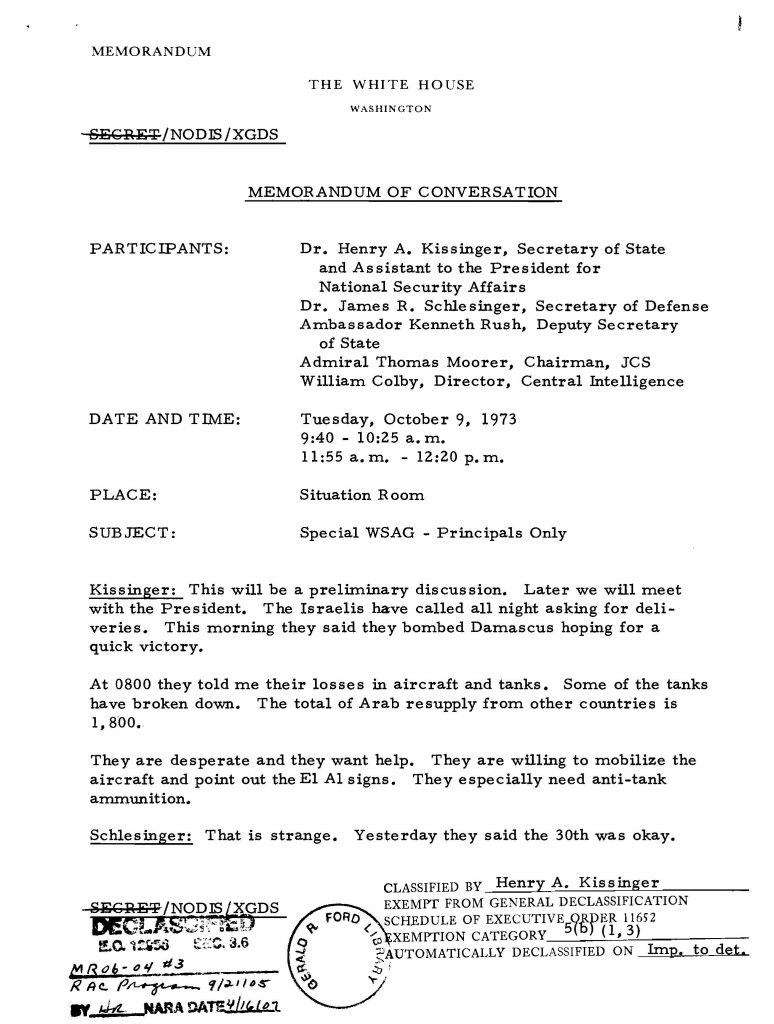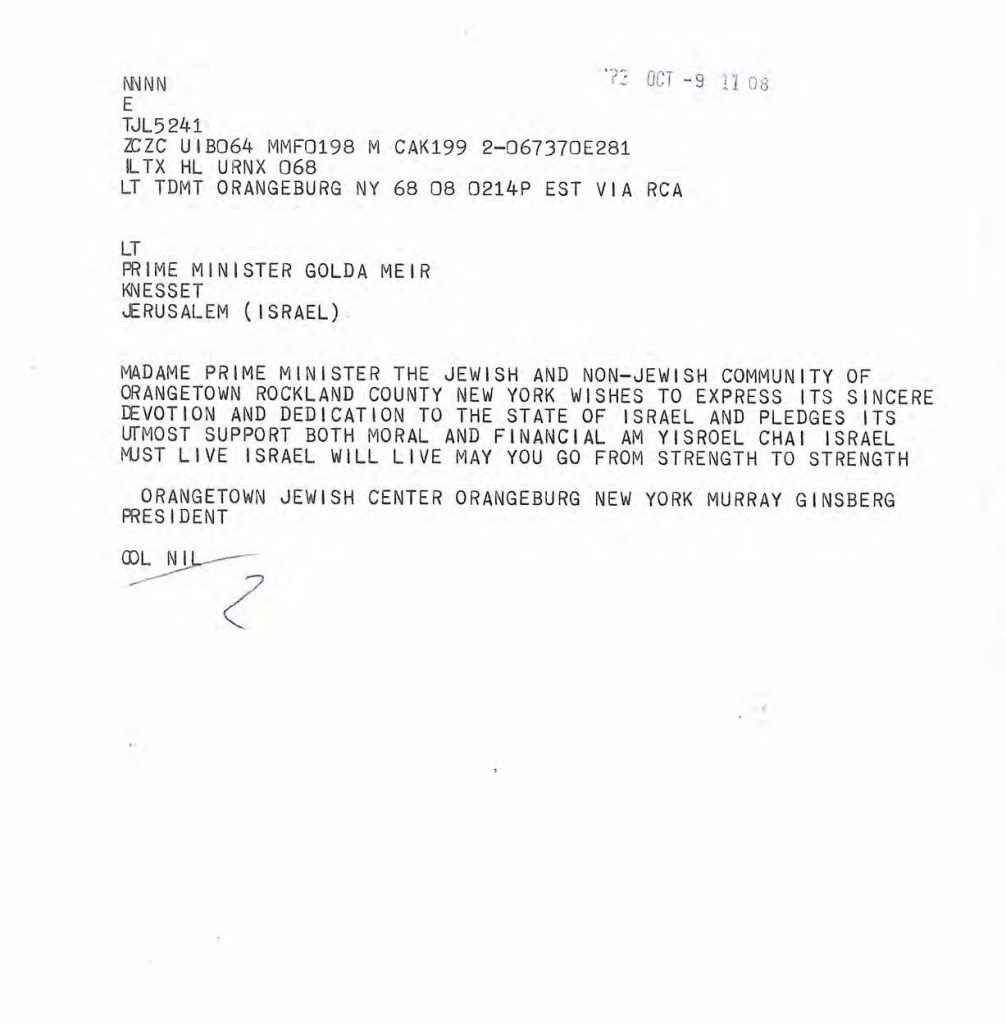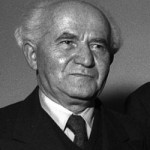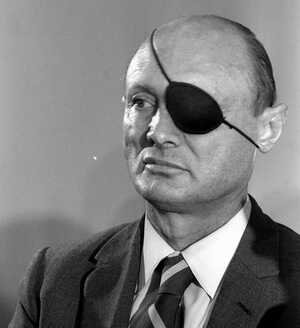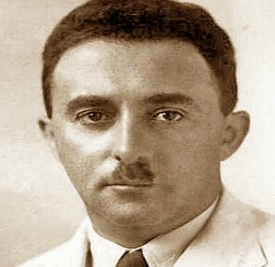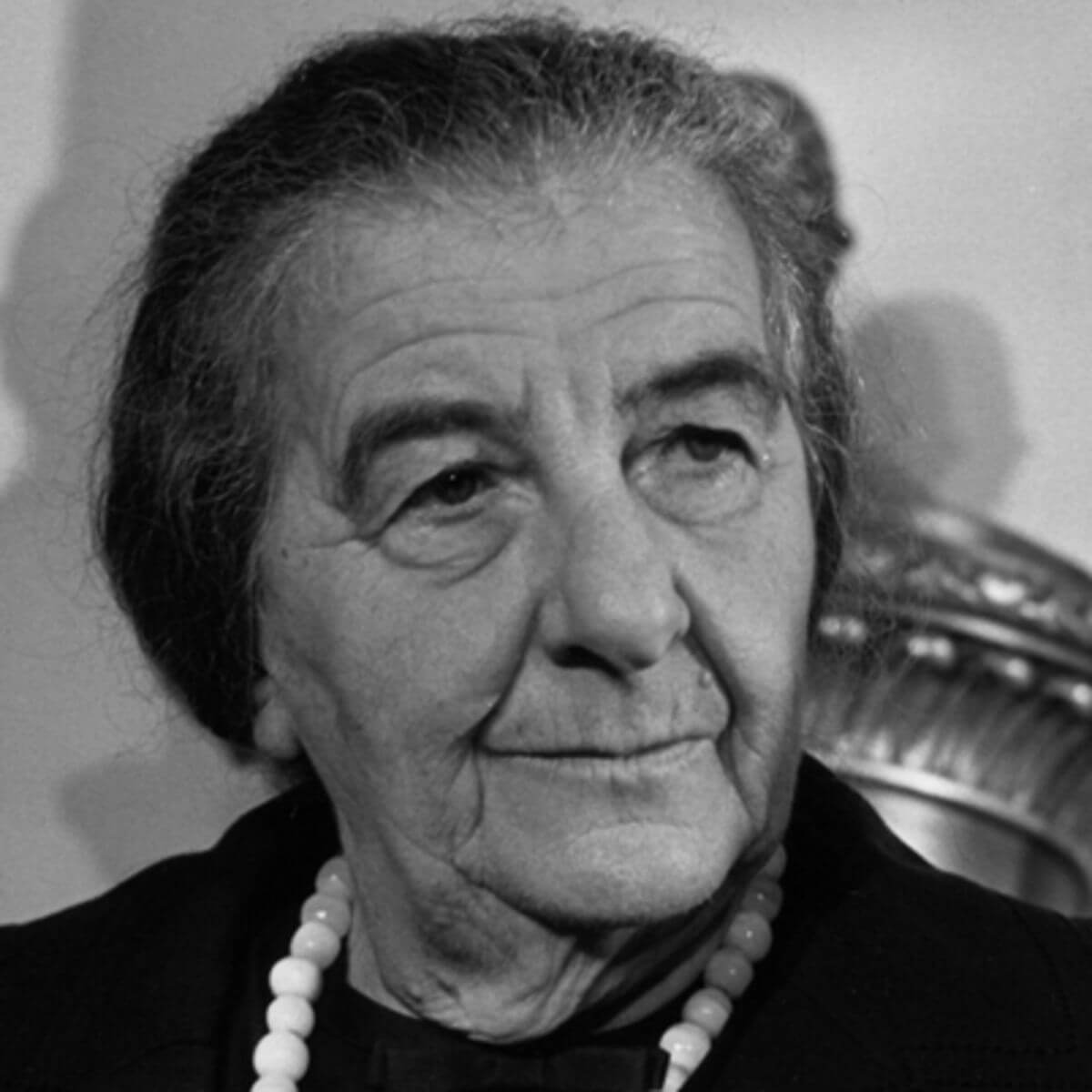ה.1 | Between Euphoria and Despondency
The third day of the war was one of extreme reversals in the feelings of Israel’s leadership, which ranged from euphoria to despondency. The morning seemed to predict good news, as the situation on the Golan Heights began to shift in favour of the IDF. Three divisions began an attack on the Syrian forces and pushed back their forward positions. In the south, the divisions led by “Bren” Adan and Arik Sharon began preparations for a gradual attack on the Egyptian bridgeheads in the central and southern sectors of the Suez Canal.
The reports Golda Meir received in the morning painted a more encouraging picture of the beginning of a counter-attack by the IDF in the south, as seen in a short consultation with the COGS at 09:50. Elazar requested and was granted permission by the prime minister for an air attack on a number of targets in the area of Port Said and Port Fuad. In view of the feeling that the Egyptians would soon be pushed back across the Canal, the COGS claimed that with regard to the ouposts on the Canal line, the ‘historic argument’ is over'”. Only two had fallen, some had been evacuated and others were being held by Israeli forces and doing their job well (For the full minutes of the consultation in Hebrew, see: Cabinet Document No. 12).
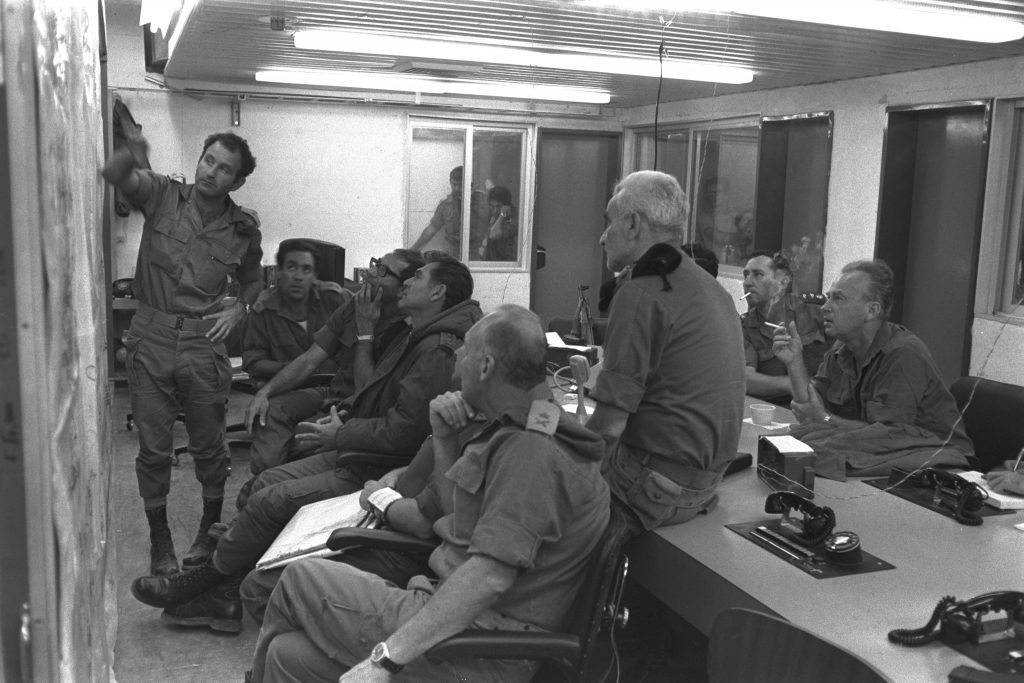
A consultation in the War Room of Southern Command, with Chief of Staff Elazar (third from the right), on his left OC Southern Command Gonen (Gorodish). Behind them: the ex-Chief of Staff Yitzhak Rabin, 8 October 1973. Photograph: Shlomo Arad, GPO
The optimism continued during the government meeting immediately afterwards. The COGS hoped that by the next day the IDF would return to the ceasefire lines in the Golan and possibly even cross them, if the government gave them permission. He also reported on the successful progress of the counter-offensive in Sinai. They considered the possibility, if conditions permitted, of crossing the Canal in some places that same day and reaching the western side, using the Egyptian bridgeheads. Later Elazar reported that the IDF might already have a bridgehead on the western side. The ministers were also told about intercepted Egyptian communications which expressed distress and calls for help. Golda expressed complete support for the plan that the IDF would cross the ceasefire line in its counter-attack, in order to put Israel in a better strategic position, and also “because they [the Arabs] have to be taught a lesson, that for every act such as this, they have to pay”. Less than a day after the despair of 7 October and the discussions on how to defend Israel’s heartland, there was already a feeling of elation and approaching victory, and even talk by Allon of capturing extensive territories in Syria and threatening Damascus. Several ministers, including Galili, Pinhas Sapir and Joseph Burg warned against premature euphoria, when heavy fighting and many casualties were expected. The government decided that “the prime minister and the defence minister are authorized to permit the IDF, if possible, to occupy military holds on the other side of the Canal, and beyond the ceasefire line in the Golan Heights to improve our positions in the face of renewed offensives by the enemy” (For the full minutes of the meeting, see: Government Document No. 8).
The possibility that the IDF would soon push the enemy armies back made it imperative to prevent a ceasefire resolution in the Security Council. In a telegram sent by the prime minister to Eban before the next session, she reported the improving situation, and added that therefore “it is inconceivable that we will accept a ceasefire resolution as long as the enemy has not been thrown back and his attack has not been broken.” She instructed him “to try to prolong the discussion and the resolution” (See: Telegram No. LV/786).
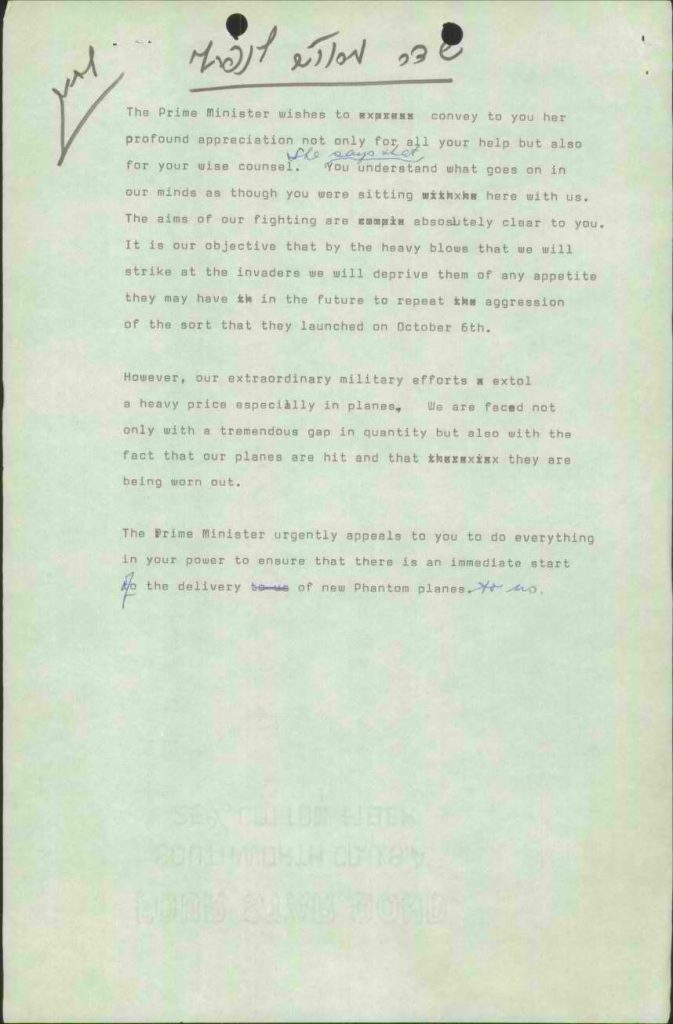
Message to Secretary Kissinger 8 October 1973, File A 4996/3, p. 129
The optimism in the bureau reached its peak that afternoon, when Lior reported that the Egyptians had issued a declaration which Israeli military intelligence interpreted as preparation of the public for a possible failure. The Canal crossing had not yet been carried out, but the force prepared for it was ready. “The Egyptian dispositions are collapsing and we are hitting them hard … “Bren” is on the Canal and moving down it”, in the words of the report. On the issue of American military supplies, it also seemed that the efforts were bearing fruit: “There is a decision in principle by Nixon on the Phantoms. Now it is only a matter of carrying it out… Kissinger is searching for a way to fly them over”, reported Golda after a telephone call with Dinitz, a report that later proved to be premature. The Americans also wanted to know if there were indeed Israeli forces west of the Canal, as Dinitz had said (See: Telegram No. LV/988).
In the contacts with Kissinger, it was repeatedly emphasized that Israel was fighting not only against the Arabs, but also against the Soviet arms with which they had been supplied for years (See: Telegram No. LV/34). Kissinger spoke, on the one hand, of his support for Israel. In his words, “You must hit them hard and strong, and you must win”; and he promised to make every effort both to postpone the discussion in the Security Council and to ensure that military supplies were sent. On the other hand, Kissinger conveyed the message that Pentagon officials were creating great obstacles on the arms issue, and that of the Phantoms was even more difficult. Great pressures were being brought to bear on Nixon, and it was only thanks to Kissinger and White House chief of staff General Alexander Haig that Nixon continued to support Israel, the secretary emphasized (See, for example: Telegrams Nos. LV/983, 996).
In fact, however, according to recently published US documents, at the beginning of the fighting the Administration adopted a policy of non-intervention, as required by the US interest of safeguarding the policy of détente with the USSR and relations with the Arab world. Supplying weapons to Israel at the height of the battles was in direct contradiction to that policy and a massive resupply of weapons could be carried out only after the fighting had ceased. They believed that even if the war lasted longer than expected, it would end with a crushing Israeli victory. Thus, Israel’s desperate demands for arms, and especially for 40 warplanes, seemed to them unreasonable and exaggerated.
During the early evening hours the reports sent by Gazit to Dinitz still expressed confidence that the balance was clearly moving in the IDF’s favour (See: Telegram No. LV/792 English translation A 4996/3, p.147 ). However, after the elation of the morning and afternoon, events swung against Israel. At 19:50 another consultation was held, where it was reported that on the northern front there was fear of a renewed Syrian attack by two fresh armoured divisions, although the situation was already much better.
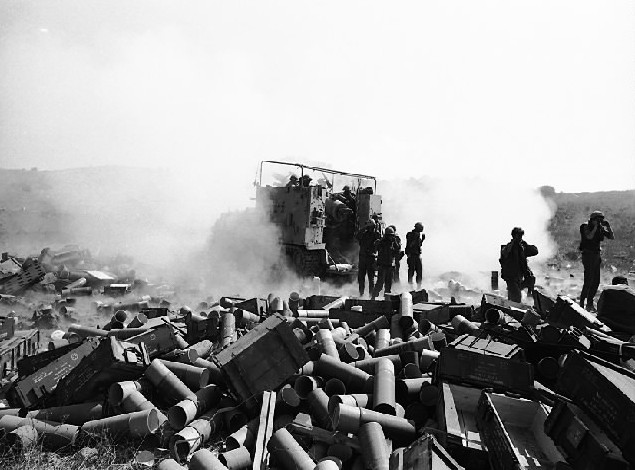
An artillery unit during the battle known as the Vale of Tears on the Golan front, October 1973. Photograph: Wikimedia, IDF Spokesperson’s Unit
However, in the south, it became clear that all the optimistic messages earlier that day resulted from a severe breakdown in communications between the fighting forces in the field and the command headquarters in the rear. Contrary to the reports, the counter-attack had failed and had entailed a heavy toll in tanks and casualties. Instead of crossing the Canal, there was again talk of establishing an alternative line in the Sinai. At this point, Golda Meir began to lose patience with the contradictory reports reaching her, turning the IDF’s impressive military successes into failures just hours afterwards and creating unrealistic illusions: “Only this morning Arik [Sharon] had to be ‘held back'”, she said, and added with surprise and a hint of criticism: “This morning “Dado” said “they (“Bren” and Arik) are asking for permission to cross [the Canal]” (For the full minutes of the consultation in Hebrew, see: Cabinet Document No. 13).
An hour later, a government meeting was held at 21:00. First Sapir reported on increased donations by Jews abroad to a fund-raising drive, and a plan for a voluntary loan from the Israeli public to finance the cost of the war. The euphoria of the morning was now replaced by a dark mood. The COGS reported briefly on the situation at the fronts, a report very different from his previous statement, and on the failure of the counter-attack in the south. Sharon’s division, which had received the order to attack, did not even enter into a real fight. Afterwards, Bar-Lev, who had been sent the previous day by the COGS to assess the situation in the north, reviewed the Syrian attack on the Golan Heights. Golda reported on Israel’s demand that any ceasefire agreement would be accompanied by an agreement for a prisoner-of-war exchange. After the ministers expressed their concern at the fact that already, at such an early stage of the war – which might continue for a long time – the IDF had been left with no reserves, the meeting broke up with the feeling that the situation was still serious and a long hard war was anticipated (For the full minutes of the meeting, see: Government Document No. 9).
The changes in mood were also expressed in the bureau journal, together with Dayan’s feeling that the ministers had lost their faith in him. “Recently I haven’t been getting on with friends, with our friends”, he said, and Galili reported that “we’re beginning to feel internal public criticism and talk of an “Israeli fiasco” (For the full journal entry, see: Prime Minister’s Bureau Journal 8.10.73).

